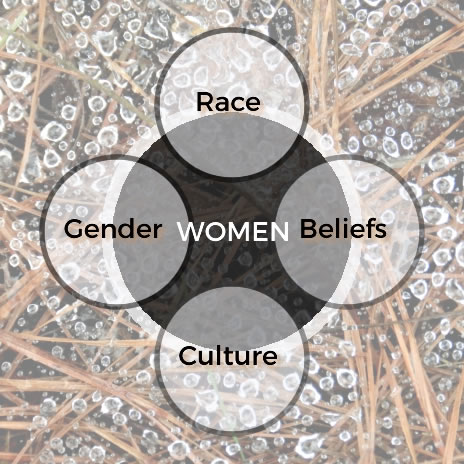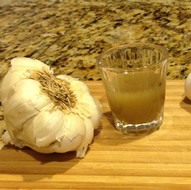Secrets To A Happy Gut
Secrets To A Happy Gut
The basis to a healthy lifestyle is having a healthy gut. I’ve been learning about this for many years. It is definitely a step-by-step journey that takes time and patience. It’s not always a fun topic of conversation. Many folks shy away from discussing things like pooping habits, fiber, digestion, etc.. In the interest of better health, I will drop any semblance of shyness and discuss it openly. The first step is to understand why a healthy gut is important and what to do to help it heal.
The gut not only rules our body, in my opinion, our gut rules our emotions and thinking abilities as well as our immune system. To illustrate this point, here’s a short video prepared for the Gut Microbiota For Health World Summit 2015, which outlines why it’s important to pay attention to gut health:
Brain Health and Gut Health
There is a surprising link between gut health and anxiety. In 2014, a research team from Oxford published findings in the Journal of Psychopharmacology, which offers some preliminary evidence that there is a powerful link between gut bacteria and the human brain. (Prior to this research, research was performed on animals and not on humans). Forty-FIve healthy participants participated in the study. For three weeks, they took either a placebo or a prebiotic. At the end of the study period, they were given computer tests that tested how they processed emotionally charged information. The results of one of the tests showed that the participants that took the prebiotics paid less attention to the negatively charged words than to the positively charged information than those who took the placebo. This suggests that those who take prebiotics have less anxiety when facing emotionally charged negative situations. According to Carolyn Gregoire, in an article published by the Huffington Post entitled The Surprising Link Between Gut Bacteria And Anxiety, this effect is similar to that which has been observed among individuals who have taken antidepressants or anti-anxiety medication.
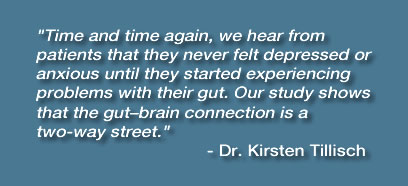 The article states: “The researchers also found that the subjects who took the prebiotics had lower levels of cortisol — a stress hormone which has been linked with anxiety and depression — in their saliva when they woke up in the morning.”
The article states: “The researchers also found that the subjects who took the prebiotics had lower levels of cortisol — a stress hormone which has been linked with anxiety and depression — in their saliva when they woke up in the morning.”
FOOD AS MEDICINE
You already know that I believe in nourishment. I also believe that supplements are important during certain phases of our lives and they can provide us with the physical support we need to overcome certain obstacles. Having said that, I do not believe in continual supplementation.
My mission as an integrative nutrition health coach is to always guide my client towards using FOOD AS MEDICINE.
Keeping that in mind, I offer to you several suggestions for your consideration and further research. I have tried most of the suggestions below (not all of them) at one point or another. I have included references to various links, as most of the material I have learned has only been available because of wonderful people that have shared their wisdom with me. I have tried to properly credit the material. If I have neglected giving proper credit to someone, I apologize in advance, as it is never my intent to utilize someone’s work with proper acknowledgement.
Generally (un)Known Secrets to a Happy Gut:
- Add Smoothies to your life. I try to get at least 2 cups daily. My method is to use dark, leafy greens (approximately half of the total ingredients), fresh or frozen fruit (unsweetened), nuts and super foods (maca, chia seeds, raw cacao, goji berries, hemp seeds, etc…) in every smoothie. I also try to vary the produce I use. We even travel with our Nutribullet.
- Kefir – My mom always said that my grandfather,Z”L, believed that eating 1 cup of yogurt a day was the key to good health and young looking skin. I totally agree. I would also suggest that Kefir provides the same benefits. Kefir contains B vitamins, enzymes, and pro-biotics. If you are dairy-free, water kefir is an excellent source. You can even make it at home. (There are lots of people who will provide you with the starter culture. You will have to ask around).
- Homemade Bone Broth – 1 cup/day (reference: Weston Price Foundation). Let me know if you want some information on how to prepare this.
- Soil Based organisms (I have not yet tried this tip). According to my research, it can also be used to make homemade yogurt. I must say that I am intrigued by this and plan to do further research on this for an upcoming article, but here is a brief explanation: current farming methods, which rely heavily on pesticides and fertilizers have produced soil that is virtually lifeless. Fertile soil should contain a combination of naturally occurring micro-organisms (a.k.a. Soil Based Organisms) that contain enzymes, which protect the growing plant (our food) from fungi, yeasts, and other parasites. When we eat fruits and vegetables that are grown in nutrient-rich soil, we automatically ingest these beneficial organisms (which help our gut stay healthy by protect us in a similar way they protected the plant). These are available as supplements.
- Probiotics are strains of good bacteria and yeasts. Our body is full of bacteria and yeast. Probiotics help keep our gut healthy by eliminating the bad bacteria and maintaining balance of the yeast in our gut. One can get lots of wonderful probiotics by eating or drinking fermented foods, like yogurt or coconut water kefir. During the past year, I started making my own fermented foods at home.
It started easily enough – I successfully made coconut water kefir. Then, I started getting carried away. I made yogurt, tried to make milk kefir (I will try again), then progressed to kombucha, now I am fermenting veggies and fruits. Yes, you CAN get probiotics from a supplement, but why not get what you need from REAL FOOD?. According to an article on Daily Health Post: “In an effort to maintain digestive health, probiotic supplements have emerged and become very popular. The probiotics you buy in a bottle are bacteria cultured in a laboratory. Most of them contain additives to preserve the bacteria or make them easier to pour or measure from the bottle. Be wary of store-bought supplements: some contain additives like maltodextrin from genetically-modified corn and manufacturers are not required to list fillers on the labels. If you supplement, look specifically for organic cultures. Adding pill or powdered supplements of any kind poses questions of efficacy and dosage.”
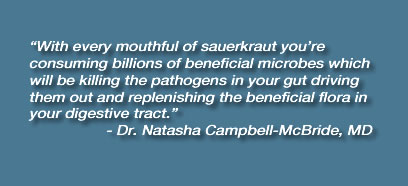
- Apples – We’ve all heard the saying “An apple a day keeps the doctor away.” Apples are said to destroy pathogenic microorganism and feed & heal the immune system.
- Kombucha (strong taste, needs to be acquired) – Drinking kombucha is believed by many to be an excellent way to get rid of excessive candida albicans in the gut. I recently had a yummy ginger/pear kombucha tea that I purchased from Natural Grocers. After a colleague made some kombucha, I decided that I, too, would make some. Yup. I have a batch continuously brewing now.
- For those that eat meat, I have been told that eating 1 ounce of liver (yuk), three times per week will provide the necessary B-vitamins that are needed to detox your system and achieve gut health. No. I have not yet tried this one.
- Lentils or Beans – I highly suggest eating between 1-2 servings per day of legumes.
- Coconut water – I absolutely LOVE coconut water! Please make sure to purchase the ones that have no added sugar. You can get coconut water at most natural food stores. I also love coconut milk.
- Coconut Oil – I add at least 1 TBLSP every day into my food. Coconut oil contains medium chain fatty acids that kill candida in the large intestine. An easy way to take it is to add it to eggs in the morning. I just add a TBSP into my bowl and place the scrambled eggs over it to melt it. It tastes good with a little bit of Himalayan sea salt (can be purchased in bulk at the natural food stores).
- Basil tea (aka tulsi tea) – This will be the subject of a future food focus. I have enjoyed this tea, however.
- Caprylic acid – As we know, restoring a normal balance of microorganisms in the digestive tract is essential to healing the gut. When a yeast overgrowth occurs, natural anti-fungals are a wonderful way to restore balance. Caprylic acid is a fatty acid that has antifungal properties and can be found in certain plants and their oils (e.g.- coconut oil and palm oil). It is also available as a supplement.
- Food-grade diatomaceous earth – Diatomaceous earth (DE) is a soft powder that contains fossilized shells of microscopic water-dwelling organisms. Although it feels like a soft powder, the particles are extremely sharp. DE can be used to cleanse the digestive tract by purging parasites, viruses, bacteria, and toxins that may be clinging to our digestive tract. According to an article in ProcessedFreeAmerica.org, “It has also been shown to cling to bad fats in the body, effectively reducing bad cholesterol. Diatomaceous earth is then expelled through our bowel movements and these harmful materials are removed.”
- Fermented cod liver oil is known to contain Vitamin A, D, K, EFAs (I have heard great results as well as awful results with this one. Do your research and proceed with caution). I have used cod-liver oil capsules in the past.
- Andrographis for immune system support. I have not used this before. It is known as “King of Bitters” and is believed to improve liver and gall bladder function, aid digestion (by increasing bile flow), and benefit liver function when the liver is toxic or under stress.
- Sauerkraut or other raw, fermented foods. – See above. I got way too carried away in the probiotics section.
- Brazil Nut (ONLY 1/day) – every day – According to Lawrence Wilson, MD, “individuals with more serious digestive problems, such as Crohn’s disease, stomach stapling or other difficulties, have a much higher risk of selenium deficiency.” Don’t eat too many brazil nuts in one day, because too much selenium can be toxic.
- Celtic Sea Salt (a pinch in a glass of water or broth every day) is rich in micro-minerals. I also use the Himalayan sea salt for cooking, etc…
- Add a little bit of fresh squeezed lemon juice to water to help alkalinize the body.
- Raw LOCAL honey helps bifidum bacteria grow in the gut. Raw local honey has been used for generations to improve immune system health.
- Egg yolk – 1 per day (nutrients help detoxification, which supports good gut health). When I first started learning about gut health, I became very familiar with Body Ecology and their materials & books. They “love a good egg”. Eggs are an ancient food and a wonderful source of nutrition. Eggs provide a vital source of protein, vitamin A, vitamin D, folic acid, phosphorus, sulfur, choline, sodium, and potassium. Eggs yolks contain lecithin, which helps lower serum cholesterol.
- Stinging Nettles – According to Naturalnews.com, “Nettle leaf is effective at reducing symptoms of the digestive tract ranging from acid reflux, excess gas, nausea, colitis and Celiac disease. Additionally, it’s medicinal action on mucous membranes makes it an effective herbal treatment for sore throats, swollen hemorrhoids, nose bleeds and mouth sores.” ALWAYS consult with your health care practitioner before using any herb extract, infusion, or tincture, as there may be serious side effects when combined with other herbs or pharmaceuticals.
- Kelp is a superfood. It is believed to help with liver function, brain function, constipation, and digestion. It is of utmost importance to know the source of the kelp you are consuming to ensure that it was not obtained from polluted waters. Also, do not use it every day, because it contains iodine. MODERATION is the key.
- Epsom salt baths – I add 1 cup of Epsom salts and 1 cup of baking soda to the tub. I often add some amazing essential oils to the Epsom salt BEFORE I add it to the water. I would not recommend this practice daily. Three times/week for 20 minutes is an excellent way to help your body detoxify and absorb magnesium (no more than 20 minutes). Epsom salt (hydrated magnesium sulfate) is rich in both magnesium and sulfate, which are both easily absorbed through the skin.
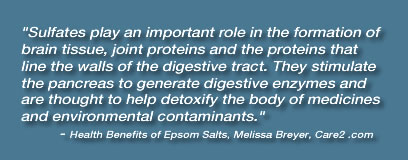
I am NOT a doctor and any suggestions I have included in this article (and on my website) are provided for your further research and education. I urge you to speak with your health care provider before implementing any of the suggestions provided.
In closing, remember to not take it too seriously. Life & healing are meant to be fun. “A GOOD GUFFAW FROM THE BOTTOM OF THE BELLY” will make your gut happy.
References
- http://www.huffingtonpost.com/2015/01/04/gut-bacteria-mental-healt_n_6391014.html
- http://link.springer.com/article/10.1007/s00213-014-3810-0/fulltext.html
- http://www.positivehealth.com/article/environmental/health-benefits-of-soil-based-organisms
- http://www.gardeningknowhow.com/garden-how-to/soil-fertilizers/antidepressant-microbes-soil.htm
- http://wellnessmama.com/12908/kids-need-dirt/
- http://www.webmd.com/digestive-disorders/features/what-are-probiotics
- http://nourishingplot.com/2014/06/21/sauerkraut-test-divulges-shocking-probiotic-count/
- http://dailyhealthpost.com/lab-results-reveal-shocking-probiotics-count-in-sauerkraut/
- http://wholehealthchicago.com/2009/05/11/caprylic-acid/
- http://www.processedfreeamerica.org/resources/health-news/793-health-benefits-of-diatomaceous-earth-
- http://www.regenerativenutrition.com/king-of-bitters-kalamegha-andrographis-p-180.asp
- http://drlwilson.com/Articles/SELENIUM2.htm
- http://www.livestrong.com/article/525634-brazil-nuts-health-digestion/
- http://bodyecology.com/articles/eggs_controversial_food.php
- http://www.care2.com/greenliving/health-benefits-of-epsom-salt-baths.html

